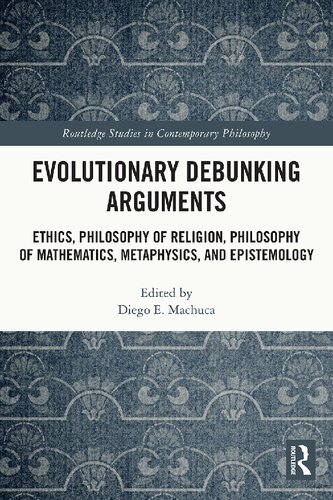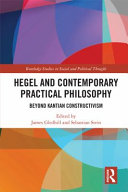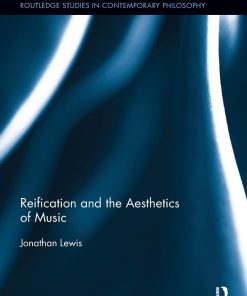Evolutionary Debunking Arguments Routledge Studies in Contemporary Philosophy 1st Edition by Diego E Machuca ISBN 9780367458447 0367458446
$50.00 Original price was: $50.00.$25.00Current price is: $25.00.
Evolutionary Debunking Arguments Routledge Studies in Contemporary Philosophy 1st Edition by Diego E Machuca – Ebook PDF Instant Download/Delivery: 9780367458447 ,0367458446
Full download Evolutionary Debunking Arguments Routledge Studies in Contemporary Philosophy 1st Edition after payment

Product details:
ISBN 10: 0367458446
ISBN 13: 9780367458447
Author: Diego E Machuca
Evolutionary Debunking Arguments Routledge Studies in Contemporary Philosophy 1st Edition Table of contents:
1 Introduction
1.1 Overview
1.2 Preview of the Essays
Notes
References
Part I Ethics
2 Debunking What?
2.1 The Problem
2.2 Epistemic and Practical Debunking
2.3 The Entanglement Objection
2.4 Debunking de dicto and de re
2.5 Resistance, Retreat, or Capitulation
2.6 The End
Notes
References
3 The Evolutionary Debunking of Quasi-Realism
3.1 Introduction
3.2 Evolutionary(+) Explanations of Moral Beliefs
3.3 Debunking Arguments
3.4 Is Quasi-Realism Vulnerable to Debunking Arguments?
3.5 Reliability Challenges
3.6 Does Quasi-Realism Face a Reliability Challenge?
3.7 Why the Challenge Is Challenging
3.8 Strategies for Addressing the Challenge
3.8.1 Denial
3.8.2 Answers
3.9 Conclusion
Notes
References
4 Fine-Tuning the Darwinian Dilemma
4.1 Introduction
4.2 Street’s “Darwinian Dilemma”
4.3 Coincidences
4.3.1 Conceptual Analysis
4.3.2 Is a Coincidence Required?
4.4 Probability and Surprise
4.5 An Appeal to Chances?
4.6 The Fine-Tuning Analogy
4.6.1 The Fine-Tuning Problem
4.6.2 The Coincidence Problem and the Fine-Tuning Analogy
4.7 … and the Lord Taketh Away
4.7.1 Problems with the Principle of Indifference
4.7.2 Problems with Unbounded Ranges
4.7.3 Fine-Tuning and Theism
4.8 Summary and Conclusion
Notes
References
5 Virtue Epistemology and Evolutionary Debunking of Morality
5.1 Introduction
5.2 Global Evolutionary Debunking Arguments
5.3 Modally Secure Moral Beliefs
5.4 The Achievement Conception of Undercutting Defeat
5.5 New Questions and Constraints for Global Evolutionary Debunking
5.6 Undercutting Abilities
5.7 Undercutting Creditability
5.8 Conclusion
Notes
References
Part II Philosophy of Religion
6 Debunking Arguments in Parallel: The Cases of Moral Belief and Theistic Belief
6.1 Introduction
6.2 Formulating Debunking Arguments
6.3 The Scope of Debunking Arguments
6.4 The Counterfactual Formulation
6.5 The Explanatory and Probabilistic Formulations
6.6 The Companions in Guilt Formulation
6.7 Conclusion
Notes
References
7 Rationalization, Reasons, and Religion
7.1 Introduction
7.2 Debunking Arguments and the Religious Reasons Reply
7.3 Rationalization and Rationality
7.4 Evidence of Religious Rationalization
7.4.1 CSR Explanations
7.4.2 Confirmation Bias
7.4.3 Positive Self-Illusions
7.4.4 Cognitive Dissonance
7.4.5 Motivated Reasoning
7.4.6 Epistemic Sheltering and Indoctrination
7.4.7 Love
7.4.8 Spiritual Kindling
7.5 Deflecting the Case for Rationalization
7.5.1 Rich Testimony
7.5.2 Epistemic Benefits of Love and Epistemic Paternalism
7.5.3 Epistemically Self-Promoting Propositions
Notes
References
8 Natural Nonbelief in God: Prehistoric Humans, Divine Hiddenness, and Debunking
8.1 Introduction
8.2 The Problem of Natural Nonbelief
8.3 Was NN Prevalent among Prehistoric Humans?
8.3.1 The Cognitive Science of Religion
8.3.2 The Ethnographic Record and Ethnographic Analogy
8.3.3 The Cultural Evolution of Religion
8.3.4 The Archaeological Record
8.4 Would NN Be Surprising Given Theism?
8.5 Conclusion: The Common Consent Argument for Theism
Notes
References
9 Milvian Bridges in Science, Religion, and Theology: Debunking Arguments and Cultural Evolution
9.1 Introduction
9.2 The EDA of Griffiths and Wilkins
9.3 An Internalist Response to EDAs
9.4 Context Biases and Cultural Evolution: Milvian Bridge Reconstructed
9.5 Expert Beliefs in Science and Religion
9.6 Folk Beliefs in Science and Religion
9.7 Conclusion
Notes
References
Part III Philosophy of Mathematics
10 The Epistemological Challenge to Robust Mathematical Platonism: A New Hope?
10.1 Introduction
10.2 The Benacerraf–Field Challenge
10.3 “Non-Robust” Responses to the Benacerraf–Field Challenge
10.4 Enoch’s Defense of Robust Metanormative Realism
10.5 A “Third-Factor” Defense of Robust Arithmetic Platonism
10.6 Extending the Strategy
10.7 How Does This Strategy Differ from Linnebo’s “Boring Explanation”?
10.8 Is Field’s Version of the Benacerraf Challenge the Real Epistemological Challenge for Platonism?
10.9 Conclusion
Notes
References
11 What Logical Knowledge Is Needed to Account for Our Mathematical Knowledge
11.1 Introduction
11.2 Formulating EDAs
11.2.1 Traditional Approaches and Easy Answers
11.2.2 The Benefits of Being Lazy
11.2.3 Special Reasons for Distrust?
11.3 Mathematical EDAs and Knowledge of Logical Coherence
11.3.1 The Structuralist Consensus
11.3.2 How Much Logical Knowledge?
11.4 Conclusion
Notes
References
Part IV Metaphysics and Epistemology
12 On Debunking Color Realism
12.1 Introduction
12.2 Robust Realism
12.3 From Color-Free Explanations to Defeat
12.4 Evolutionary Explanations
12.5 Easy Possibilities
12.6 Coincidental Accuracy
12.7 Conclusion
Notes
References
13 Debunking, Theoretical Indispensability, and Irreducible Epistemic Rationality
13.1 The Basic Debunking Argument
13.2 Conceptual Excavation for Tacit Epistemic Rationality Norms
13.2.1 Methodological Preliminaries
13.2.2 Digging for Tacit Rationality Norms
13.3 The Cartesian Gambit: Methodic Doubt
13.4 The Theoretical Indispensability of Epistemic Rationality Norms
13.5 Hume’s Law and Epistemic Irreducibility
13.6 Conclusion
Notes
References
14 Global Debunking Arguments
14.1 Introduction
14.2 Global Defeaters Cannot Be Defeated
14.2.1 Global Debunking Arguments, the Evolutionary Argument against Naturalism, and the XX Pill Case
14.2.2 Three Theses About Defeating Global Defeaters
14.3 Three Types of Global Debunking Argument
14.3.1 Pure-Undercutter
14.3.2 The Undercutter-Because-Rebutter
14.3.3 Undercutters-While-Rebutters
14.4 The Conditionalization Problem
14.4.1 Explaining the Problem
14.4.2 Epistemic Origin Stories
14.4.3 A Solution to the Conditionalization Problem*
14.4.4 EO-Solution and Two Objections to EAAN
Notes
References
15 Global Evolutionary Arguments: Self-Defeat, Circularity, and Skepticism about Reason
15.1 Introduction
15.2 The EDA and Self-Defeat
15.3 The EVA and Circularity
15.4 Aporetic Reason
15.4.1 Self-Undermining Reason
15.4.2 Virtuous Circularity?
15.4.3 Skepticism about Reason
15.5 Conclusion
People also search for Evolutionary Debunking Arguments Routledge Studies in Contemporary Philosophy 1st Edition:
3 arguments for evolution
arguments against evolutionary biology
evolutionary z
evolutionary debunker
arguments for veganism
Tags: Diego E Machuca, Evolutionary Debunking Arguments, Contemporary Philosophy
You may also like…
Politics & Philosophy
Uncategorized
Politics & Philosophy - European & American Philosophy
Uncategorized
Politics & Philosophy - Social Sciences
Politics & Philosophy - Social Sciences
Africanizing African Legal Ethics Routledge Studies in African Philosophy 1st Edition John Murungi











